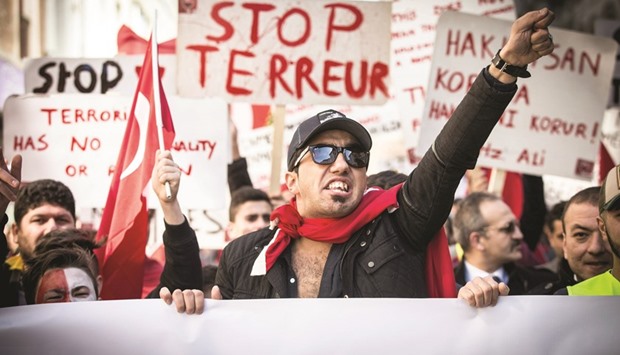The Brussels-based Islamic State (IS) terrorists behind the Paris attacks had planned a fresh strike in France but targeted the Belgian capital instead as police closed in, a prosecutor said yesterday.
Belgium’s federal prosecutor also announced that the so-called “man in the hat” Mohamed Abrini, seen in CCTV footage at Brussels airport before the bombings last month, had been charged with “terrorist murders”.
Suicide bombers killed 32 people at the airport and a metro station on March 22, and left a trail leading directly to the November attacks in Paris which left 130 dead.
“Numerous elements in the investigation have shown that the terrorist group initially had the intention to strike in France again,” the federal prosecutor’s office said in a statement. “Surprised by the speed of the progress in the ongoing investigation, they urgently took the decision to strike in Brussels.”
The prosecutor gave no details, but the Brussels blasts followed the March 18 arrest of top Paris attacks suspect Salah Abdeslam after four months on the run.
“It’s extra proof of the very high threats to the whole of Europe and to France in particular,” French Prime Minister Manuel Valls said of the prosecutor’s statement.
“We will not let our guard down,” he added on a visit to Algiers.
Abrini, who grew up with Abdeslam in the troubled Molenbeek area, was charged yesterday with “participation in the activities of a terrorist group, terrorist murders and attempts to commit terrorist murders”.
On Saturday, the judge leading the Belgian investigation into the Paris carnage had laid the same charges against Abrini, the day after his arrest.
The 31-year-old Belgian of Moroccan origin confessed to being “the man in the hat” who calmly walked away from the devastated Brussels airport departure hall, the prosecutor said on Saturday.
He returned on foot to central Brussels, discarding his hat and coat on the way before disappearing into thin air as police launched a fresh public appeal for help.
Abrini was a long-time petty criminal who grew up in Molenbeek, home to several other suspects who all share a similar story of getting on the wrong side of the law and becoming radicalised.
One of the Brussels airport bombers, Ibrahim El Bakraoui, left behind what the Belgian authorities described as a “will” on a computer in which he said he felt “hunted” and “I don’t know what to do”.
The other airport bomber was Najim Laachraoui whose DNA was found on a suicide vest discovered at the Bataclan concert hall in Paris where 90 people were killed.
Laachraoui is widely believed to have been the cell’s bombmaker.
About an hour after the airport blasts, Ibrahim’s brother Khalid blew himself up at Maalbeek metro station, not far from the European Union headquarters district in Brussels.
The federal prosecutor gave no details of the planned attack in France but late last month, French police arrested Reda Kriket near Paris, finding weapons and explosives in a flat he had used to suggest he was planning an act of “extreme violence”.
Belgium has arrested several suspects in connection with the Kriket case and on Thursday remanded two – named as Abderrahmane A and Rabah M – in custody.
Shortly after Kriket’s arrest, French prosecutor Francois Molins said that “while no specific target has been identified, nonetheless everything leads us to believe that the discovery of this cache has allowed us to prevent an action of extreme violence by a terrorist network”.
The Belgian authorities have faced intense criticism over their handling of the Brussels attacks and the investigation, especially when it emerged that many of the suspects were long known to the police.
Critics say that the government has not done enough to prevent extremists targeting Muslim youth in areas such as Molenbeek, with Belgium proportionately the biggest source of foreign fighters going to join the IS group in Syria.
Abdeslam, whose brother Brahim blew himself up in Paris, was seen driving to the French capital with Abrini shortly before the attacks but he apparently balked at the same mission and fled back to Brussels.
Police finally arrested him not far from the family home in Molenbeek after apparently stumbling upon another Islamic militant safe house in the Forest area of the city.
Buoyed by Abdeslam’s arrest, the police launched an increasing series of raids, mainly in Brussels, which netted Abrini on Friday.
Abdeslam is now awaiting extradition to France.

People take part in a march ‘Ghent against terrorism’ organised by three Turkish organisations yesterday in Ghent, Belgium.
